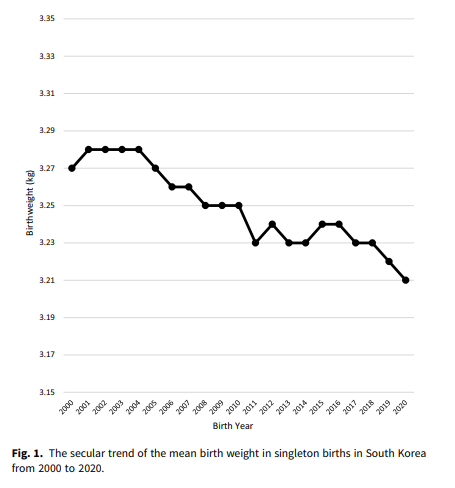Researchers at Kookmin University said Koreans’ birth weight (BW) and gestational period decreased by 3 grams and 0.28 days, respectively, each year for the past 20 years.

Professor Hur Yoon-mi of General Education at Kookmin University conducted the study by analyzing Korean birth weight data obtained from the Korean Statistical Information Service between 2000 and 2020.
Accordingly, singleton birth weight decreased from an average of 3.27 kg in 2000 to 3.21 kg in 2020, which roughly translates to a decrease of about 3 grams annually. Furthermore, the study also found that the gestation period or the pregnancy term also decreased by 5.6 days over the past 20 years.
However, comparatively, twins exhibited a steeper decline, losing 5 to 6 grams of birth weight each year with a reduced gestation period of 8.2 days over the 20 years.
During this period, the prevalence of macrosomia (BW > 4kg) decreased from 3.7 percent to 2.5 percent, but the percentage of underweight infants increased from 3 percent to 4.1 percent in singletons and from 46.1 percent to 54 percent in twins.
Professor Hur attributed the increase in premature and low birth weight babies to the increase in twin pregnancies, as well as the increase in the rate of induced labor, and cesarean section (C-section).
She added that the development of medical technologies in saving low-birth-weight babies also played a role in the declining birth weight trend observed in the study.
“As low birth weight or premature babies have a lower survival rate, they can experience growth retardation, and also have a higher risk of diseases compared to normal babies,” said Professor Hur. “Effective public health strategies aiming to reduce the incidence of low birth weight should be quickly implemented.”
The results of the study were published in the international journal, 'Twin Research and Human Genetics'.

